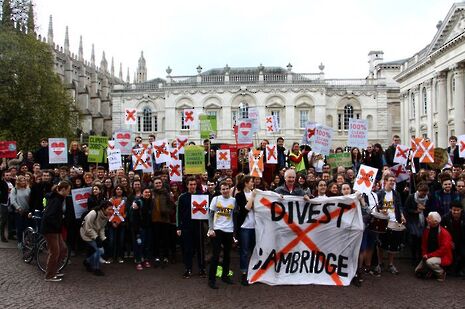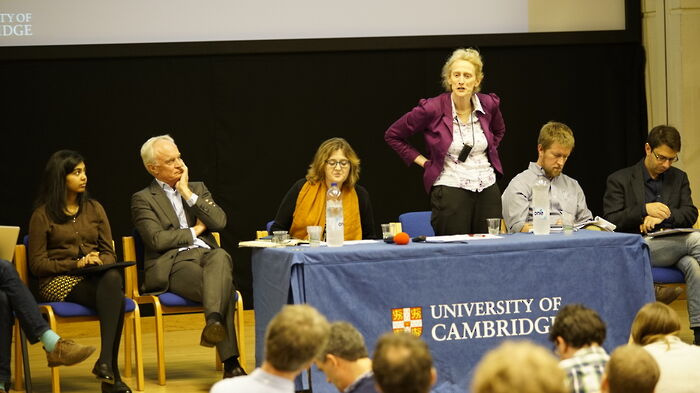University faith leaders unite in push for divestment
Coordinated by Just Love Cambridge, the Interfaith Statement on Divestment implores the University to lead by example and divest from fossil fuels

Twenty faith leaders from the Cambridge community have signed an open letter calling for the University of Cambridge to fully divest from fossil fuels.
The Interfaith Statement on Divestment aims to bring “faith-based perspective to the table”, and was coordinated by Just Love Cambridge, a student society which seeks to “express Christian faith through campaigning for justice, peace and fairness”.
The open letter from University’s faith leaders stated: “Our faith traditions call for us to live in a way that promotes justice upon the earth, with love and respect for those with whom we share the planet.” It pointed to the “devastation that climate change has caused, to both people and planet” and demanded that the University “take up a place of global leadership” by divesting from fossil fuels, particularly given the university’s capacity to have a “remarkable impact” on world issues, proven “over the past eight centuries”.
Many of the signatories are well known, influential figures of the faith community. These include: Dr Rowan Williams, former Archbishop of Canterbury, master of Magdalene and long-term campaigner for climate justice; Dr Tim Winter, Islamic chaplain to the University; Dr Rachael Harris, Buddhist chaplain to the University and Mgr Mark Langham, the University’s Roman Catholic chaplain. The letter was also signed by chaplains from eight colleges including Rev. Jeremy Caddick, chaplain of Emmanuel College, who has a long-term involvement in the divestment campaign.
Speaking to Varsity, Rev. Caddick said: “The statement highlights the way that the world’s faith traditions have a huge amount to say about how and why we value the natural world”, adding “it isn’t just ours to destroy”.
Chaplain of Pembroke College Rev. James Gardom spoke to Varsity about the values of ‘worship and community’ present in faith communities, stating that religion “can enable people to look beyond their private interests to the common good”. He added: “These represent an irreplaceable component and set of perspectives when we consider the sustainable use of our planet.”
In the Interfaith Statement on Divestment, faith leaders called on the University to “continue [the] process of shaping the world for the better” by taking a stance of global moral leadership.
This sentiment was expressed by many at the ‘town hall’ meeting on divestment, hosted last week by the University’s divestment working group. As Varsity reported, Mia Finnamore, environmental officer on Trinity College Students’ Union, said that Cambridge University, as an institution which “prides itself on being a world leader”, had a responsibility to “lead by example” on the issue.
The open letter criticised the University for “financing companies who are bringing great harm to the planet, and to the most vulnerable living on it”. It stated the “moral imperative” of divestment and said that “engaging with fossil fuel companies on climate change cannot bring the change we need in the time we have”. They added: “Scientists now agree that unless 80% of current fossil fuels remain in the ground, we are in danger of doing catastrophic damage to the biosphere from large scale dieback of the Amazon Rainforest to bleaching of the Great Barrier Reef.”
The complexity of the debate was highlighted by the Rev. Dr David Neaum, chaplain of St Catharine’s. Speaking to Varsity he said: “Even when people agree on the desired end of reducing carbon emissions, there are divergent views on what is the best way of achieving that end.” He emphasised that the University has a “significant role to play in research that will aid reducing emissions” and added “many companies have different divisions and many kinds of collaborations are possible. Advocating divestment is not designed to inhibit these collaborations. Rather, the Interfaith Statement on Divestment will hopefully apply moral pressure on the University to remember and signal to the world that the ‘contribution to society’ that is at the core of the University of Cambridge’s mission is a contribution to the common good of our society.”
Tim Lornie, former campaigns officer of Cambridge University’s Zero Carbon Society, was quick to praise Cambridge’s faith leaders for joining the “wide range of voices” of the “broad-based and dynamic” divestment movement.
Just Love Co-President Neil Gran agreed, stating: “This statement brings together many powerful voices within Cambridge’s faith community, urging the University to take a role of global leadership and divest from fossil fuels.”
The faith leaders powerful appeal for full fossil fuel divestment concluded: “We believe that divestment is morally right, and that it is effective… we believe that the University has an opportunity to take a place of global leadership, to be part of bringing in a better world. We, as faith leaders from across Cambridge, call on the University to take this opportunity. We call on the University to divest”
 News / Right-wing billionaire Peter Thiel gives ‘antichrist’ lecture in Cambridge6 February 2026
News / Right-wing billionaire Peter Thiel gives ‘antichrist’ lecture in Cambridge6 February 2026 News / Cambridge students uncover possible execution pit9 February 2026
News / Cambridge students uncover possible execution pit9 February 2026 Features / From fresher to finalist: how have you evolved at Cambridge?10 February 2026
Features / From fresher to finalist: how have you evolved at Cambridge?10 February 2026 News / Epstein contacted Cambridge academics about research funding6 February 2026
News / Epstein contacted Cambridge academics about research funding6 February 2026 News / Churchill plans for new Archives Centre building10 February 2026
News / Churchill plans for new Archives Centre building10 February 2026










